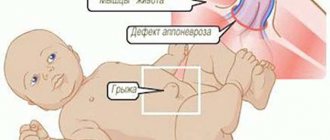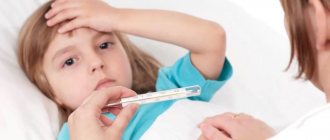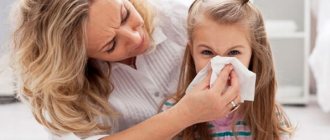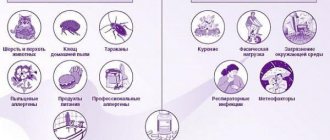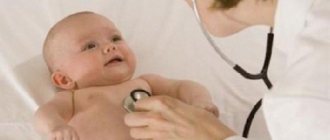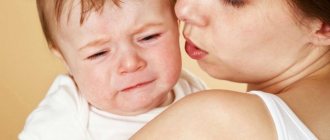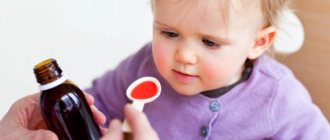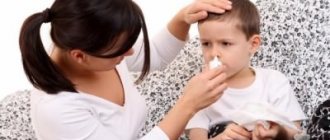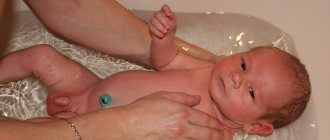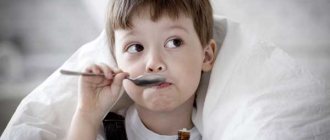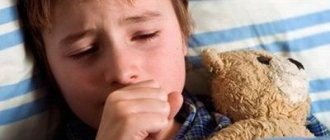Cough is a protective mechanism of the body that helps a person get rid of mucus and foreign bodies accumulated in the respiratory tract, and at the same time pathogenic microorganisms (viruses and bacteria). A cough in a one-year-old child is most often a sign of acute respiratory viral infection, but other reasons for its appearance are also possible. In any case, you should not ignore this symptom; you should consult a doctor for a diagnosis and treatment.
Treating a baby’s cough must be approached with full responsibility, since many medications are contraindicated for children under one year of age (more details in the article:)
Causes of cough in a baby
In order to cure a cough in a one-year-old baby, it is necessary to establish the cause of its occurrence. The most common of them are:
- viral and bacterial diseases of the upper and lower respiratory tract (bronchitis, laryngitis, pharyngitis, etc.);
- measles, whooping cough and other childhood infections;
- adenoids;
- bronchial asthma;
- penetration of a foreign body into the respiratory tract (piece of food, dust, etc.);
- allergic reactions;
- dry air in the apartment;
- psychogenic factor (cough occurs only in stressful situations).
How to treat a severe cough in a one-year-old child
The treatment regimen for a severe cough in a one-year-old child differs, depending on the cause and accompanying symptoms.
- Pneumonia and bacterial bronchitis. Broad-spectrum antibiotics, mucolytics and expectorants are prescribed. Along with antibiotics, you need to take probiotics to avoid dysbiosis. Treatment is complemented by inhalations and other physiotherapeutic procedures.
- For fungal bronchitis, antifungal agents are prescribed. Taking antibiotics for such a disease is not advisable and dangerous.
- Allergy. If you have an allergic cough, you need to eliminate any contact with allergens. To alleviate the child’s condition, he is given antihistamines in therapeutic dosages.
- A foreign body in the respiratory organs also leads to intense coughing attacks. If the child coughs heart-rendingly and has difficulty breathing, you should immediately go to the hospital. Symptoms of a foreign body in the respiratory organs are noisy breathing and cyanosis of the skin.
For whooping cough and parapertussis, broad-spectrum antibiotics and expectorants are prescribed. Steam inhalation helps eliminate a cough attack due to whooping cough. Parents should know that coughing in this case drags on for 2-3 months. In the old days, whooping cough was called the “hundred-day disease.”
Treatment of the disease in a one-year-old child
Cough in a one-year-old baby is not an independent disease, it is only a symptom, so the main treatment should be aimed at eliminating the cause.
For a viral etiology of the disease, the doctor will prescribe antiviral drugs (Anaferon, Viferon, etc.), for a bacterial etiology - antibiotics, etc. Also, the choice of drug depends on the type of cough - dry or with sputum.
Below are medicines approved for use against cough in children aged 1 year, but they cannot be used without the consent of a doctor, as they have contraindications and side effects. In addition, the cause of the illness may be a serious illness (pneumonia, bronchial asthma, etc.), and the baby’s condition may worsen.
Preparations for the treatment of wet cough
| Name | Operating principle | Mode of application |
| Ambrobene syrup or Lazolvan (for children) |
| |
| Solution for inhalation and oral administration Ambrobene or Lazolvan | Inside:
Inhalation (the indicated amount of the drug is half diluted with 0.9% NaCl):
| |
| Syrup Linkas | Herbal anti-inflammatory drug, promotes the removal of mucus from the bronchi |
|
| Bromhexine syrup | Mucolytic expectorant action |
|
Preparations for the treatment of dry cough
| Name | Operating principle | Mode of application |
| Drops Codelac neo | The active ingredient butamirate citrate has an antitussive effect |
|
| Drops Sinekod | ||
| Stoptussin drops (we recommend reading:) | The composition includes butamirate and guaifenesin, which have an antitussive and expectorant effect. | The dosage of the drug depends on the child’s weight:
|
| Eucabal syrup | A preparation based on plantain and thyme has an expectorant and anti-inflammatory effect. |
|
Application of compresses and warm baths
On the 3-4th day from the onset of the disease, provided the body temperature is normal, a warming compress or bath can be given to a child over the age of one year. These procedures are aimed at improving blood circulation and relieving inflammation.
You need to boil two potatoes, mash them with a fork and mix with 20 ml of vegetable oil and 2 tsp. 70% alcohol. Wrap the warm mass in a gauze napkin and apply it to the baby’s back, avoiding the area of the spine and heart. Wrap the child in a scarf for 40 – 60 minutes.
The use of warming compresses is allowed only if the body temperature is normal
You can also treat a cough using warming wraps (see also:). Dissolve 1 tsp in a glass of warm water (40-43 °C). mustard powder, soak a piece of cotton cloth in the solution, wring it out and wrap it around the baby’s back and chest. Wrap the baby warmly for 60 minutes, then wipe the skin first with a damp, then dry cloth.
You can make a warming bath with a water temperature of 39-40 °C. The duration of the procedure is 10 minutes, do not wet the head, then wipe the baby dry with a towel and dress in cotton clothes.
Rules for inhalation
On the recommendation of a doctor, you can do steam inhalation. To do this, you need to bring the child to a pan with a hot decoction of chamomile, coltsfoot or soda solution (3 tsp per liter of water) so that he inhales warm steam for several minutes.
Often, the doctor recommends treating a cough with inhalation through a nebulizer using drugs based on ambroxol. The medicine, in accordance with the age dosage, is diluted in a 1:1 ratio with 0.9% sodium chloride solution, and the procedure is carried out in the morning and evening. During inhalation, the child should be in a calm state so as not to provoke a severe cough.
Massage
To do this, place the baby so that the head is slightly lower than the body. Using your palm, lightly pat the child’s back in the direction from the lower parts of the lung upward. The procedure can be performed several times a day, especially after sleep.
Effective traditional medicine recipes
Folk remedies are no less effective in fighting cough; they are usually used as an additional treatment. The most effective recipes approved for treating babies:
- pour dried figs into a glass of hot milk and leave for 30 minutes, take 100 g 2-3 times a day;
- Grate a medium-sized radish on a coarse grater and mix with honey (if you are not allergic), leave for 2 hours, strain through cheesecloth and take 2 tsp. 3 times a day;
- Pour 20 g of pine buds into half a liter of boiling water, leave for 30 minutes, give the baby 2 teaspoons three times a day;
- aloe juice, mixed half with water, has an anti-inflammatory effect and strengthens the immune system (10 ml 3 times a day);
- mix 100 g of honey, juice from a third of a lemon and chopped garlic clove, take 2 tsp. three times a day.
Aloe juice helps to cope with a lingering cough, as it effectively resolves mucus that accumulates in the bronchi
How to cure a cough in a one-year-old child at home
Cough is one of the most typical and important symptoms of illness in children. Many parents are confident that they can cope with it on their own, without resorting to the help of specialists. Very often this leads to the wrong choice of antitussives.
Meanwhile, making an accurate diagnosis of what caused this symptom and timely treatment help to successfully cope with both the cough itself and its cause.
This is of particular relevance in children under one year of age, whose body has specific structural and physiological characteristics.
Disease Prevention
To prevent coughs and colds in a one-year-old baby, the following rules should be followed:
- the temperature in the apartment should not exceed 20-22 °C; it is better not to use electric heaters unless necessary, as they reduce the humidity in the room;
- harden the baby, take him for walks every day (at an air temperature of at least 18 ° C);
- the child must eat well, receive a sufficient amount of vitamins and microelements;
- Avoid contact with ARVI patients.
Treating a one-year-old baby is not as scary as a newborn - the child already seems to you to be fully studied, you believe that his condition is always under your control, and that you understand the causes of his ailments no worse than doctors. Is this really true?
Unfortunately, parents often turn out to be too self-confident, which does not have the best effect on the baby’s health. Many people begin to remember how they used to treat a child for the same symptoms, forgetting that the same symptom - for example, cough - accompanies a number of diseases, and each has its own remedy.
A cough in a 1-year-old child can be caused by a number of reasons. First of all, it should be determined whether he needs treatment at all.
As you know, by the age of 12 months, babies are actively teething. Very often this is accompanied by excess saliva, and the child may simply choke on it.
Since a young researcher at this age explores the world around him with interest, in case of a coughing attack, check to see if he has put any inappropriate object into his mouth.
And of course, coughing while eating is most likely the result of eating too quickly, rather than illness (although there may be exceptions; sometimes coughing while eating is caused by problems with the digestive system).
If all of the above reasons are definitely not related to coughing attacks in a child, and the cough itself becomes frequent and prolonged, you should be concerned. And first of all, consult a doctor. As a rule, at this age the most common cause of cough is ARVI, but other options are also possible: bronchitis, measles, laryngitis, etc.
Do not give your child any medications until the doctor prescribes them! It is very important!
The regimen for a child with a cough includes a calm environment, not too active games, long, sound sleep, and warmth. In addition, to strengthen the immune system, proper nutrition is important; during illness, a child benefits from vitamin C (in general, it is necessary for a healthy person, and especially for a sick person). Let the baby drink as much as possible. If you have not weaned him yet, then give him more breast milk - it stimulates the immune system.
Some “folk” remedies can already be used against cough in a 1-year-old child. Herbal decoctions that can be purchased in pharmacies have a mucolytic (that is, sputum-thinning) effect, for example, licorice root or coltsfoot - excellent expectorants.
An “iodine mesh” is often used against a cough—several strips of iodine are applied to the child’s chest and back using a cotton swab. Important! – on the chest the “mesh” should be drawn above the collarbones, and on the back - below the shoulder blades. Never apply iodine directly in front of your heart!
You can make a kind of heating pad from freshly boiled jacket potatoes - they are wrapped in a clean scarf and applied to the same places on the chest and back. The warming effect helps remove phlegm and relieve cough.
Cough is the most common symptom of colds in children of the first and second year of life. Despite the fact that the presence of a cough in a child indicates damage to the bronchi, larynx or trachea, its presence is useful, since when a child coughs, the airways are cleared of harmful microbes and sputum that has accumulated for a long time.
Causes of wet and dry cough in a 1 year old child
Before treating a coughing child, it is necessary to establish the true cause of its appearance:
- the presence of an inflammatory process in the upper (nasopharynx, oropharynx, nose) and lower (lungs, trachea, bronchi) respiratory tract;
- inflammation of the sinuses, adenoids;
- cough as a symptom of bronchial asthma can act in the form of suffocation;
- excessively dry and warm air in the children's room;
- contact with allergens that cause coughing.
In some cases, a cough may be psychogenic in nature when it manifests itself in a situation that is stressful for the child. Then it is necessary to consult with a child psychologist and find out the exact cause of the fear, as a result of which the child begins to have a severe cough.
It is possible that the baby swallowed a foreign object and therefore began to cough actively and for a long time. In such a situation, it is necessary to immediately provide first aid to the child and contact medical staff.
Cough in a 1 year old child: how to treat it?
Treatment of cough in a child, if he is over 1 year old, necessarily requires close attention from a doctor and an ENT specialist in order to exclude further complications in the development of the disease.
At home, parents need to ensure that the child follows a sleep-wake schedule, and additionally ensure peace and quiet during the period of illness.
Drinking plenty of fluids and proper nutrition, rich in beneficial microelements and vitamins, can strengthen the baby’s immunity and speed up the healing process. Since a child spends a lot of strength and energy fighting his illness in the form of a cough, his diet should be high in calories so that the body can replenish energy losses. Drinking plenty of fluids will help remove mucus from the bronchi more quickly.
If a child is 1 year old and has a severe cough, you should distinguish between dry and wet cough, as they require different treatment. For example, there is herbion syrup, presented in two versions: for wet cough and dry. Cough tablets can be given to a one-year-old baby in crushed form, after mixing with liquid. However, the administration of syrup is preferable, since it begins to act faster and more effectively.
The doctor may prescribe the following medications as expectorants: glaucine, butamirate, prenoxyndiazine, ACC,. The use of mucolytic drugs is not able to completely cure a child of a cough, however, they help alleviate the cough, as they dilute the mucus formed in the bronchi.
To treat a cough in a one-year-old child, you can turn to traditional medicine, which suggests using marshmallow root, licorice, plantain leaves, coltsfoot, and thyme to liquefy mucus in the bronchi and quickly remove it from the child’s body.
If the cough is caused by allergies, your doctor may prescribe antihistamines.
If a child coughs at 1 year of age for a long time and conservative treatment does not have the desired effect, the doctor may prescribe potent medications that block the cough reflex at the level of the cerebral cortex: codeine, dimemorphan, ethylmorphine. However, the advisability of their use is discussed with the attending physician and treatment occurs under close supervision by medical staff, since, despite their high effectiveness, such drugs have serious side reactions that are undesirable at such an early age.
It should be remembered that cough is not a disease in itself, but acts only as a symptom of a disease that needs to be treated. And only complex therapy with the use of expectorants will help the little man recover faster.
Cough is a common occurrence when a child has a cold.
Most mothers believe that the first medicine to give their child is an expectorant. However, if the child is only one year old, such a remedy may not only not help him, but also harm him.
How to treat a cough in a child aged one year?
To know what to treat, you need to determine the cause of the cough.
Not everyone knows what occurs reflexively in order to clear the airways of accumulated sputum or foreign body. Cough is not a disease, but a symptom.
Depending on the presence of sputum, cough occurs:
- Dry
- Wet
- Protracted
The cause of a dry cough is inflammation of the trachea, larynx or irritation of cough receptors.
It may indicate the onset of acute respiratory infections, ARVI, pneumonia, gradually turning into wet.
In the case of diseases such as pharyngitis and laryngitis, mucus does not appear. The cough remains dry and persistent until the disease stops.
Also, a dry cough may indicate allergies or increased salivation during teething.
Appears when phlegm accumulates in the larynx. The symptom requires a mandatory visit to the pediatrician to listen for wheezing in the baby.
In a one-year-old child, sputum very quickly descends into the bronchi, causing bronchitis. By prescribing expectorants to your child yourself, you can harm him.
The baby coughs very weakly, and as the amount of sputum increases, he does not have enough strength to push it out.
Contact your pediatrician so he can prescribe proper treatment.
A child's cough that lasts is called a protracted cough.
more than 2 weeks. In this case, self-medication is strictly prohibited. Be sure to examine the baby. You may have to go to hospital.
Finding the cause of cough in a one-year-old baby is difficult. After all, he cannot tell you his feelings. Do not self-medicate - contact your pediatrician.
A 1 year old child has a cough, how to treat it, what to do?
Probably every parent will panic if their one-year-old child starts coughing. I want the illness to go away quickly and without consequences. But the average person may not always be able to determine the cause of the disease. But the effect of treatment will depend on its early determination. Therefore, you definitely need to show your baby to a doctor.
Causes and types of children's cough
Many parents are trying to find a remedy that can stop their child’s cough. In fact, coughing is a protective reaction of the body; it helps remove accumulated mucus in the respiratory tract or a foreign object. You should not try to get rid of a cough; you need to influence the cause of its occurrence.
Causes of cough include:
- Inflammatory process in the upper or lower respiratory tract.
- An allergic reaction when the allergen irritates the mucous membrane.
- Reduced humidity in the room or dry air.
- Spasm in bronchial asthma.
- Psychosomatic factors, such as a stressful situation.
- Penetration of a foreign object into the respiratory tract.
If the inflammatory process in the respiratory organs begins due to viruses, then the body temperature may rise, a runny nose, sore throat and cough may appear. The cough will initially be dry without phlegm.
You should not hesitate to go to the doctor, especially with a small child.
After the pediatrician prescribes therapeutic measures and treatment is started, the dry, debilitating cough will turn into a more productive, wet one.
A child's cough can manifest itself in different ways and does not always indicate a serious illness. Here are the types of cough a child may have:
- Bitonal - it manifests itself in two sound tones, low, accompanied by a high-pitched screeching sound. This happens when the trachea or bronchi are compressed, for example with tumorous bronchoadenitis.
- Barking cough - just from the name it is clear that the cough sounds like a dog barking. No sputum is produced. Often such a cough appears when the trachea or larynx is damaged.
- Convulsive, or convulsive - it manifests itself with quick, jerky exhalations. Inhalation can be noisy and sharp, sometimes even leading to vomiting. A similar condition occurs with a disease such as whooping cough.
- A spasmodic type of cough - it happens due to spasms of the larynx when the lower nerve is affected. Occurs in pathologies of the larynx.
How to treat a cough in a one-year-old child?
The goal when treating a dry cough in an infant is to make it moist so that mucus can easily leave the respiratory tract. Therefore, you will need several drugs:
- First: mucolytic agents. They will thin the mucus. But such drugs are not prescribed to small children, since they do not yet know how to spit it out. Therefore, mucolytics are prescribed after 2 years.
- Second: expectorant medications to quickly remove mucus.
- Third: antitussive drugs. They are necessary to suppress the cough reflex with a dry and debilitating cough.
There are also combination drugs on sale that are aimed at thinning mucus and expectorating it. These include lasolvan, bromhexine, and ambrobene.
In any case, all these drugs should be prescribed only by the attending physician. Products can be natural or synthetic. All of them can cause adverse reactions and have a number of contraindications.
We recommend: Bruxism in children
It is recommended that children be given medications in the form of syrups or suspensions. They taste good and are easy to swallow in liquid form.
For children 1 year of age, traditional cough treatment methods can also be used. The main thing is to consult your doctor first.
Folk remedies for cough
Initially, it is necessary to create favorable conditions for treatment and speedy recovery, namely:
- The room where the child is located should be warm, the air temperature is within 20-22 degrees. The air should not be dry; you can turn on a humidifier or place saucers of water.
- Provide peace to the baby, it is advisable that he rest more often.
- Elimination of allergens such as tobacco smoke, the presence of household chemicals, etc.
- More warm drinks in the form of fruit drinks, teas, decoctions, compotes and juices.
- Dishes should be liquid or mushy, without irritating factors.
The basis of traditional therapy is the following recommendations:
- Using recipes with honey, you can drink teas and decoctions with it, make infusions, ointments and compresses.
- Offer your baby onions or garlic.
- Prepare decoctions based on medicinal herbs such as chamomile, raspberry, linden, thyme, etc.
Traditional medicine
A cough is a consequence of any disease, so treatment should be comprehensive, aimed at eliminating the main cause that caused it.
The basis of conservative therapy is the following steps:
- Taking antitussives such as Ambrobene, Bronchicum, Stoptussin.
- Prescription of expectorants - Lazolvan, Gedelix, licorice root.
- Mucolytics – Ambroxol, Mucaltin, Linkas.
- If necessary, taking antibacterial drugs, Ampicillin, Amoxicillin, Ospamox, etc. are most often used.
Inhalations with various medications will be useful.
If there is no temperature, then it is recommended to undergo physical therapy, which may include:
- Rubbing with warming agents, ointments and other rubs, badger fat, Doctor Mom, etc. are especially useful.
- Applying warm compresses.
- UHF treatment.
- Electrotherapy with low frequency or pulsed waves.
- Electrophoresis.
- Application of infrared irradiation.
A chest massage using tapping and patting movements will be useful.
Carrying out breathing exercises. The doctor usually shows and tells you how to do this.
To prevent your baby from developing a cough, it is necessary to prevent colds. First of all, strengthen the child’s immunity.
Try to take your baby out into the fresh air more often, dress him according to the weather, his diet should be correct and balanced, consisting mainly of plant foods.
If you notice the first signs of any disease, take action immediately and do not delay treatment. Only in this case, even if a cough appears, it will pass quickly and without consequences.
Source: https://DetMed.info/kashel-u-rebenka-1-god-chem-lechit
How to treat a cough in a one-year-old child?
Regardless of the type of cough a child has, he needs to be given water more often. Water is a source of health.
Once in the throat, water washes away mucus and bacteria. The mucus thins, making it easier to cough up.
An alkaline drink is recommended - Borjomi mineral water or soda solution (1 teaspoon per 1 liter of water). Mineral water must first be left open so that the gas comes out. Alkaline drinking moisturizes the throat, eliminating soreness, and relieves redness and inflammation.
Unsweetened compotes, dried fruit uzvars, linden or chamomile tea are also suitable for drinking (make sure there are no allergies).
Also, to treat cough, children are prescribed inhalations using medications, saline or alkaline mineral water (Borjomi, Essentuki).
For a wet cough, the child is given inhalations with expectorants - Lazolvan, Mukaltin. If the baby has a dry, hacking cough, use Berodual and Ventolin (to open the bronchi) or Pulmicort (relieves swelling of the larynx). These drugs are used for a 1-year-old child only under the supervision of doctors. Pulmicort is a hormonal drug that is prescribed strictly according to the schedule depending on the severity of the disease and the weight of the child.
You can do inhalations with Borjomi or saline solution yourself. To do this, place 2-3 ml of the selected liquid into the nebulizer. A special mask is placed on the face, which is included with the device. To prevent your baby from running away, play him a short cartoon.
Inhalation with saline or Borjomi will help relieve a child’s cough if the cause of the cough is a common ARVI. But don’t expect a miracle—you won’t be able to cure bronchitis this way.
How to treat cough in a 1 year old child
Young children are very sensitive to the world around them, so they often get sick. Colds and infectious diseases are accompanied by unpleasant symptoms. A 1 year old child develops a cough.
How to treat it to ensure a quick recovery? It is very difficult for children to choose the appropriate medications and their dosage, since they are intended for older children.
I don’t want to use chemicals; they bring not only benefits to the child’s body, but also harm.
Folk remedies for cough
If you decide to try folk remedies for cough, do not harm your child.
Inhalations are an effective way to treat cough
The safest compress is cabbage. Keep 3-4 sheets in a water bath until softened. Then mash them with a fork and apply the paste to the baby’s chest and back. Leave the compress until the morning.
Helps with cough. Add baking soda to the warm milk on the tip of a spoon and 1 teaspoon of honey. Or dilute Borjomi milk - 1 to 1.
Potato inhalations are contraindicated for children of this age. Hot steam is unsafe for such a baby. It can cause spasm of the bronchi, which at this age have very narrow passages. Use folk remedies with caution.
Traditional medicine
The safest expectorants for one-year-old children are:
- Gedelix does not contain alcohol, dyes or preservatives. Contains ivy extract.
- Alteyka is a herbal preparation based on licorice root extract. Reduces swelling and has a local anti-inflammatory effect.
- - a good old remedy. Contains marshmallow, which thins mucus well. The release form is tablets; for children, the tablet must first be dissolved.
- Lazolvan, Ambrobene, Ambroxol are expectorants based on ambroxol. They thin the mucus, making it easier to cough up.
It is not recommended to use medications without a doctor’s prescription, but they are more effective than traditional methods.
Remember! Never prescribe cough suppressants to your child yourself. They act on the cough center, inhibiting the cough reflex. If there is mucus in the bronchi, the baby can literally choke on mucus. Antitussive drugs include Sinekod, Codeine, Pectolvan Stop, etc. They are prescribed for whooping cough, pharyngitis, when there is no sputum. These drugs should absolutely not be used independently.
Treatment of cough in a one-year-old child will take less time, provided the doctor’s prescriptions are followed. The main thing is that, regardless of the treatment regimen, the baby needs plenty of fluids and moist, cool air. This will make your baby feel much better, speeding up recovery.
A specialist will tell you about coughs in young children:
- How to treat a cough with sputum in a child - folk...
Illness is always unpleasant and very bad, but it is especially upsetting when a very young child falls ill. The situation here is often complicated by the fact that young parents do not know how to help their baby, and besides, a very limited list of medications can be used.
Therefore, all parents must know what to give their 1-year-old child so as not to harm his health, and in what situations self-treatment can only bring harm. In such cases, you should immediately contact a medical facility, or if the baby is in poor condition, call an ambulance.
A child of any age can get sick, but children in their first year of life are especially at risk. At first, the baby is still protected by maternal immunity, but the further from the time of birth, the higher his chance of getting sick. The immunity received from the mother weakens, and her own is not yet fully formed.
There can be quite a few reasons why a child develops a cough. They are divided into external ones, not associated with diseases, and those provoked by pathogenic microorganisms:
- In a baby, a cough can be caused by mechanical irritation of the respiratory tract, for example, when tiny dust, smoke, aerosol substances sprayed in the air, or due to excessive dryness.
- It can be triggered by an allergic reaction of any kind, including non-complementary foods or external irritants - body cream, diapers, detergents, and so on.
- Hypothermia is the main cause in young children. The mechanism for controlling body temperature has not yet formed and is not fully developed, so both overheating and excessive cooling are equally dangerous for babies.
- Respiratory tract infections are the most common causes of illness in children of any age, including one-year-olds.
From the video you can learn how to properly massage a baby for a cough:
How to distinguish a dry cough from a wet one: main features
Regardless of what caused the cough, first of all you need to get rid of not the symptom (cough), but the underlying disease or condition that caused it.
Symptoms that require a doctor
If a child’s cough is accompanied by an increase in body temperature with its constant increase, severe weakness, breathing problems, asthma attacks, refusal to eat, nausea, vomiting and other dangerous symptoms, you should seek medical help immediately.
If the cough is of an allergic nature, the child may be at risk of severe swelling of the larynx and anaphylactic shock, so he will need immediate help.
Dry cough in a 1 year old child. Features of cough treatment in one-year-old children
Cough is the most common symptom of colds in children in the first years of life. Despite the fact that a cough indicates damage to the larynx, trachea or bronchi, sometimes its presence is beneficial for the child.
This is due to the fact that during coughing the airways are cleared of harmful microbes and phlegm that has accumulated over a long period of time. But at the same time, a child’s cough is the most common cause of concern for caring parents.
How to help a one-year-old baby, and what cough remedies are the most effective?
Why does a one-year-old child have a cough?
Before treating a child’s cough, it is very important to establish the cause of its occurrence. It could be:
- inflammatory process in the upper (nose, nasopharynx and oropharynx) and lower (bronchi, lungs, trachea) respiratory tract;
- inflammation of the adenoids and sinuses;
- excessively warm and dry air in the child’s room;
- contact with cough-causing allergens;
- a suffocating cough can be a symptom of bronchial asthma.
It happens that the cough is psychogenic in nature and occurs in a child only in a stressful situation. In this case, it is important to consult a child psychologist. The cough could also occur due to the fact that the baby swallowed a foreign object.
Treatment methods
Treatment of cough in children under 1 year of age should be strictly under the supervision of a physician. Parents are required to promptly take the child to a specialist for examination and listening to the lungs.
Observe the baby’s behavior and condition; this will help you provide comprehensive information for making a diagnosis during your doctor’s appointment.
Medicines
Only after this the doctor will be able to prescribe a treatment method that will correspond to the baby’s condition.
Conventionally, all drugs are divided into 3 groups:
- mucolytics
(suppress cough and increase sputum production); - expectorant
(facilitate the discharge of sputum and intensify the cough); - sedatives
(gently act on the cough center to reduce the strength of the reflex).
Due to their age, babies can take liquid forms of drugs, which are easier for the mother to give to him; it penetrates the blood faster and begins to act. Perhaps the recipe will indicate a dry mixture. In this case, it is diluted with water. The instructions contain a detailed description and dosage.
There is a strong opinion that mucolytics should not be given to children. Due to the narrow lumen of the blood vessels and the suppression of the cough reflex, there is a possibility of mucus stagnation, which can provoke inflammation.
It is important to achieve this as soon as possible. This will allow the baby to feel better and experience less discomfort. How to treat a cough in a 1-year-old child in order to have less impact on the body and quickly restore the normal state of the body:
Parents try to use drugs that are gentle but effective. In their opinion, these are medicines based on plant extracts.
But not every cough responds well to treatment with such drugs; for example, it can be quickly stopped and treated with synthetic drugs.
We advise you to trust your pediatrician in choosing the drug and not to take the initiative to treat your baby on your own. Only a doctor will correctly determine how to treat a cough in a 1-year-old child, the nature and cause of its occurrence, and select an effective drug.
It is believed that it is impossible to harm your health if you treat yourself with improvised means from the kitchen cabinet shelf. This is an incorrect assumption, especially when it comes to the health of the baby.
When a doctor determines how to treat a cough for a 1-year-old child, ask what home remedies can be used to speed up recovery without harming the baby (see).
What will help:
- warming compresses;
- warm herbal teas;
- decoctions and infusions.
Features of the coughing child's regime
The regimen for a child who is prone to coughing should be gentle, but there is no need to significantly limit the child’s physical activity.
The fact is that movements help improve the cleansing of the bronchi from mucus accumulated in them, thereby speeding up recovery.
If the baby wants to play, parents need to do it with him, and it is better to give preference to quieter games rather than active games. It is recommended to pick up the child more often, while gently patting his small back.
The baby's diet should be gentle. If a child refuses to eat, under no circumstances should you force him.
Parents are advised to choose an alternative to the dish and offer their baby light, but at the same time very high-calorie food: fruit puree, warm milkshake, jelly, jelly.
There is nothing to worry about if for two or three days a child eats less than usual.
But you just need to drink a lot. This is explained by the fact that the liquid promotes the accelerated removal of toxins from the body, dilutes and removes phlegm. Parents should prepare their baby’s favorite juices, fruit drinks or other drinks, offer to drink them through a straw or from an interesting sippy cup, and thus, while playing, give the baby something to drink.
Source: https://DokMakarov.ru/terapiya/silnyj-kashel-u-godovalogo-rebenka.html
Safe drug treatment
Parents need to know exactly what to give a 1-year-old child for cough, because at this age you can strictly use only those drugs that are approved for such young children. Other drugs, even from the children's group, but not suitable for age, can cause serious harm to health.
Usually, the doctor prescribes drugs such as Ambroxol to improve sputum removal. They are used strictly as prescribed by the doctor, observing the dosage, frequency and duration of use. Such drugs should be combined with other procedures, for example, with massage of the child’s back and chest to improve the separation and removal of mucus.
Also, as prescribed by the doctor, other symptomatic drugs are used - painkillers, anti-inflammatory, antispasmodics, antihistamines, antipyretics, and so on.
The dosage and type of medication, as well as the duration of treatment, should be chosen by the doctor depending on the age and condition of the child, and the presence of other diseases.
With a dry cough, it is necessary to increase the separation of sputum and make it more liquid. For this, a child who is one year old is prescribed the following drugs: Gedelix based on ivy, Linkas or dry mixture. These products soften the airways, thin mucus and help eliminate it quickly.
Traditional methods
Like medication, traditional treatment includes supportive actions. They include plenty of warm drinks, which helps to more quickly cleanse the body of intoxication.
The child can be given Borjomi mineral water, from which gas is previously released, in pure form or diluted in half with milk, herbal tea, warm milk with honey and butter, if the baby is not allergic to these components.
The simplest heating with boiled potatoes works great - it's fast, cheap and effective. To eliminate congestion, a honey cake is used, which consists of equal parts of honey and flour (30 grams each) and 5 grams of vegetable oil.
If a child has a dry and suffocating cough, inhalations will help him.
For the smallest children, they can be made from mineral water such as Borjomi (soda), and for older children, one year old, they can be inhaled with regular baking soda. This simple procedure effectively warms up and softens the airways, relieving the patient of a severe suffocating cough.
